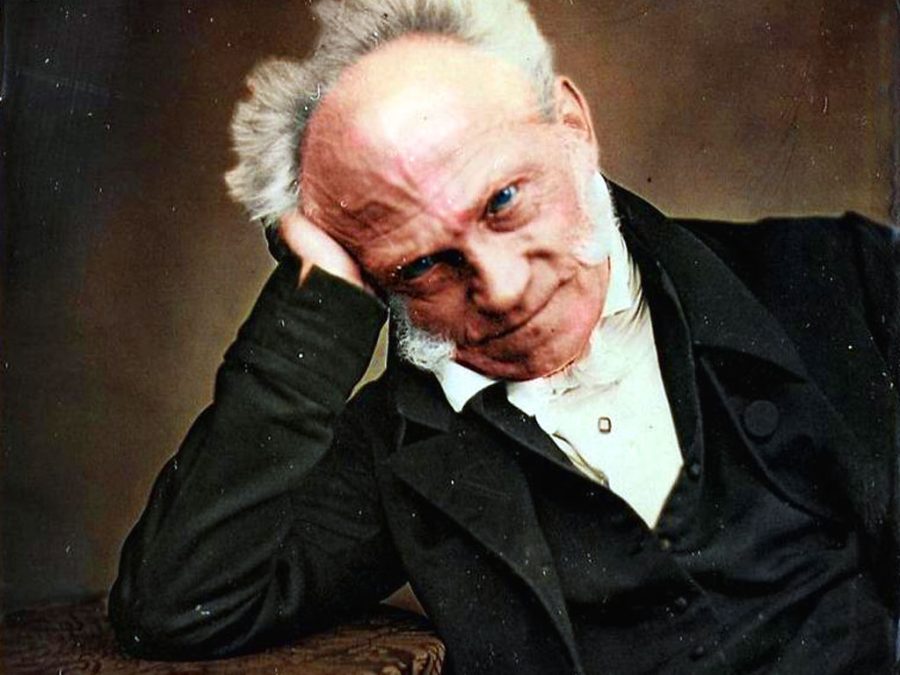Happiness Through Schopenhauer
March 10, 2023
Schopenhauer, though famous for his pessimism, is contradictorily a strong source for the philosophy of happiness. He, opposing his typical portrayal, was not at all in denial of the fact that happiness existed. Rather, he believed that people had the wrong idea of what happiness was. He defined happiness as any degree of satisfaction with a lack of suffering. According to Schopenhauer’s beliefs, happiness is not only short lived, but not a truly positive state to be in either. This poses the question of whether a person can be neither happy nor sad. It is important to note, at this point, one of Schopenhauer’s famous quotes, “Pleasure is never as pleasant as we expected it to be and pain is always more painful. The pain in the world always outweighs the pleasure.” This statement is testimony to the fact that Schopenhauer did not seek out happiness, a journey that quite possibly would have led him to a different assumption. On the opposing side, Schopenhauer, in some ways, only put into words the unspoken negativity displayed through common human behaviors. He discussed the way that humans tend to focus on the negatives, using an example of a shoe pinching one’s toe. With this justification, maybe not being sad is enough to be happy. Taking advice on happiness from an obviously depressed man who believed life was suffering can either be the guide to happiness as oneself defines it or a clear path to creating a need for a certain satisfaction that cannot be filled. This lack of fulfillment seems to be what held Schopenhauer down. He forced himself into isolation because he just didn’t see the point in human interaction, actually he found it to be intolerable. It’s not a question of why Schopenhauer was so depressed. He despised everyone, constantly questioned the meaning of existence and, of course, was unable to find a definitive answer, leaving him unfulfilled. This is ironic considering he wrote trying to convince others to
keep their expectations low, arguing that if they are not disappointed, they are satisfied to some extent, therefore happy. He was a man that needed a complete explanation that he could genuinely believe and support for everything. Schopenhauer sought a logical answer to the question of how to be happy. Fulfillment is unachievable with these standards and so he would always be slightly sad and therefore, by his own definition, never happy. But are we all just bound by this endlessly? If we look at life as an “unprofitable episode, disturbing the blessed calm of non-existence” as Schopenhauer wrote, then we cannot expect to ever be happy.
This, however, now leads us backwards in time to Socrates on ignorance. He did not believe that ignorance was bliss as the saying goes, but he did believe that ignorance was infinitely present and unescapable. He claimed his ignorance and believed he was more intelligent for simply recognizing he was not all-knowing. This seems to be some vehicle of fulfillment and satisfaction for Socrates because he does not hold himself to a standard of having to always be right. Socrates did spend his time mercilessly questioning innocent people to get them to contradict themselves though, so maybe he is not the epitome of happiness as we know it. Happiness in its physical form will never be innately connected to someone born to be a philosopher. No one who willingly questions the deepest uncertainties of the world, and their existence will be satisfied. For a more modern example, Camus thought the meaning of life was anything stopping you from killing yourself. Reasoning by such rigid logic often is hard to cope with, explaining the labels that frequently are attributed to some philosophers. It is pertinent to consider why these ideas might feel dolorous.
Schopenhauer was depressed because he was alone, not only in location, but in the boldness and depth of his thinking. Happiness can be found through the absence of worry. The
absence of worry can be found through the absence of critical thought. A critic by design, happiness was never in reach for Schopenhauer.
It is still fair to disapprove of the way he mercilessly critiqued not only individuals but humans in general through the majority of his life. It is, however, unfair to disregard the complaints he made just because they are hard to swallow. Subjectivity is fluid, as it’s intended to be, so, if Schopenhauer chose to let the happiest state he could achieve be some small state of satisfaction, that was within his own right. His view of happiness was, in fact, an idea that could benefit thinkers of any kind for years to come. It just goes to show that philosophy extends beyond finding and remaining at peace. Sometimes, philosophy and forward thinking means disturbing the peace to the fullest of your power. Provocative thinkers are the ones who make changes. Schopenhauer certainly knew what it meant to disturb the peace, because he was never truly at peace. This seems to come from a place of recognizing his own life’s work as an unfulfilled prophecy. He is not alive to see the way the way his thinking taught various lessons in the world of western philosophy. It often happens that examples can be set through not only one’s success, but also failure. Schopenhauer allowed himself to be consumed by his assertion that human life is naturally a state of suffering. Schopenhauer is proof that happiness is only what it is permitted to be.



